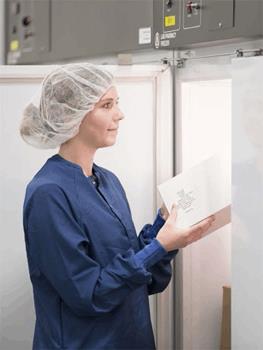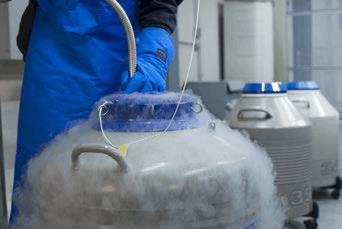Countering Complexity: Advancing Clinical Study Execution And Expediting Clinical Supplies

A Q&A with Brian Keesee, Executive Director, US Clinical Services, and Fiona Withey, Managing Director UK Clinical Service, PCI Pharma Services
ABSTRACT
The shift toward biologics, globalization of clinical trials, and regulatory and commercial pressures has placed new stresses on clinical supply chains. Service providers have responded by developing new logistical models while adding to their expertise and consultative capabilities.
INTRODUCTION
The pharmaceutical industry is going through major changes. After decades in which companies made big profits by selling easy-to-produce tablets to large patient populations, the industry is now looking to complex and costly large molecules and cell therapies to drive growth focusing on rare and complex disease states, often orphan indications. This trend in drug development often complicates administration of clinical trials.
In parallel, clinical trial teams are activating study sites in more and more countries to access the large populations of treatment-naive patients they need to bring drugs to market as fast as possible and at the same time reduce costs for patient recruitment and administration. The situation is complicated further by commercial pressure to cut costs and regulatory demands for safety and efficacy data.
Today’s clinical supply chains must ship expensive, temperature-sensitive materials with short shelf lives to countries with weak infrastructure and different regulations, languages, and cultural expectations than the sponsor. And they must do so while minimizing costs and maximizing speed.
These trends have placed new pressures on sponsors, many of which in today’s biotech-driven R&D landscape lack in-house experience of shipping drugs to study sites.
Forward-thinking service providers have responded by adopting new logistical approaches to increase the speed and flexibility of supply chains, and by building consultative teams equipped to work with sponsors to create tailored, optimized approaches.
Q&A
The adoption of new logistical approaches means companies can expedite trials and control costs despite the studies and the drugs they test becoming more complex, according to Brian Keesee and Fiona Withey, PCI Pharma Services.
In this Q&A, they discuss the trends that are shaping clinical supply chains, the models service providers are adopting to adapt while expediting studies, and how sponsors can tap into external expertise to avoid bottlenecks.
How have changes in R&D affected clinical supply chains?
Keesee: If you were to look back a decade ago, the clinical trial industry used to deal mainly with oral solid dose delivery forms that were typically shelf stable, cheap to produce, and had three to four years of shelf life.
Now the industry handle drugs that are large molecule, cold chain and parenteral delivery forms, which cost hundreds to thousands of dollars per dose and have to be stored and shipped at closely controlled temperatures, sometimes down to -140°C vapor phase for cell and gene therapies. These products often have no shelf life, are made in small batches, and take a lot longer to synthesize.
When you are distributing products like that around the world, you have got to really understand the nuances and complexities to provide the best solution, particularly with cultural differences and evolving import/export requirements. Sometimes that may even require a bit of creativity to work through challenges that can arise unexpectedly when dealing with developing countries.
Withey: These trends have coincided with the increase in clinical trial globalization, increasing supply chain complexity and patient centric approach. We are noticing a significant increase in the number of clinical sites and countries being added to individual trials, especially those involving temperature sensitive biologics. Such trials require a model based on a high degree of flexibility, efficiency and timely delivery to meet today’s challenging requirements where the supplies are often expensive and in relatively short supply. That makes your supply chain very, very complicated when coupled with various language and labeling requirements and a changing regulatory environment.
This and the factors Brian discussed drove us to look at how we manage the supply chain for global studies in terms of conserving, pooling and creating flexibility of supplies, so essentially you can use your medication for a number of protocols. It is extremely impactful for the sponsor company for both cost and efficiency.
Where did that thinking lead you?
Withey: We foresaw client requirements and developed solutions in response to the shift in the sector and their changing needs over the past few years. Examples include ‘On Demand’ or labelling at the point of dispatch and ‘FastTrack’ which increase efficiency and significantly reduce the time taken to package, label and distribute supplies to site, ensuring that the patient receives medication to expedited timelines. With the application of a label at the point of dispatch, we have developed nimble, flexible processes to supply ‘off the shelf’ primary and secondary packaged medication to different protocols and countries as required whilst managing shelf life labelling to conserve often limited supplies
Such late-stage customization maintains flexibility and allows one batch of drug to be used across multiple protocols. This is quite different to the traditional package, label and hold supply model. In late-stage customization you could potentially receive an order to label and ship just a single unit, yet it still requires all the rigor and quality systems as packaging and labeling a full batch quantity.
’FastTrack’ and ‘On-Demand’ approaches also speed up the supply chain. We can get studies set up, packaged, and released ready to be shipped to the patient within days rather than months. Our methodology, continuous improvement mentality and client and patient focus ensures a flexible and adaptable approach to expediting study supplies
How do you stay on top of these timelines?
Keesee: I often joke that we are almost obsessed on customer service in our organization. That mentality is ingrained in our culture, from the project management team to the person putting a label on a product. It makes a big difference to clients. They are looking for somebody they can trust, who has their best interests in mind, and is really flexible when it comes to speed and cost.
When in the process do you start talking to clients about their options?
Keesee: Part of the value we provide is our collective experience in providing supply materials destined all over the world. To deliver that value to the client, we really like to get involved upfront. A sponsor company may have selected a certain group of countries they intend to execute their studies in. Then we can tell the customer “evaluating that geography of the world, here’s our experience, our last three shipments to this country have taken this long” or “it’s taken us longer to get an import permit for this country”. Having that information at the site selection stage prevents delays later, expediting the trial.
The earlier we are involved in the process as a partner, the more impactful we can be in streamlining the study execution and optimizing the supply.
Withey: We engage our Project Management teams and Quality professionals right at the start of the enquiry process to ensure that we fully understand the client’s requirements and develop a bespoke proposal based on these needs. Understanding and interpreting the protocol and providing ‘upfront consultancy’ on the most effective and efficient packaging and labelling solution is where we truly add value. Our team looks at everything from the overall cost and timelines to the packaging and shipping temperature ranges to individual country licenses requirements and the capabilities of each trial site when developing and recommending proposals.
Our goal is to foresee any potential ‘issues’ up front and minimize the risk of problems arising further down the line thus ensuring the timely supply of medication. For example, this is the time to learn if sites have limited refrigeration space thus influencing patient kit packaging configurations.
 How do you maintain standards when shipping to remote locations?
How do you maintain standards when shipping to remote locations?
Withey: We have a combination of our own depots and strategic third party partners that provide logistics and depot services around the globe which we treat exactly the same as our own facilities. Our quality team audits each depot on a regular basis and holds them accountable for their actions and activities. We work intimately with these partners to ensure the client’s experience is seamless, regardless of where in the world the study is ultimately executed.
Keesee: The other aspect of ensuring success is choosing the proper shipping system. Part of our value to the client is to work with them to identify the optimal shipping solution, identifying the route to the investigational site, the costs and risk, the payload, and many other factors. This can ensure the proper technology and route is utilized, choosing the right solution but at the same time not “over engineering” to add unnecessary cost and complexity. For particular applications, we may also help the client with an end-to-end cold chain tracking methodology, technologies that report and deliver real-time information anywhere in the supply chain. Some of the medicines and therapies we are entrusted with are truly invaluable and may need that level of supply chain visibility.
How receptive are clients to your input and new ways of working?
Withey: We find that clients are extremely open to input and our insights on best practices. We have a number of clients who have partnered with us to develop these expedited processes from which we have mutually benefitted.
A lot of our clients are small to medium-sized companies that often lack a dedicated clinical team. They truly rely on our expertise and very much appreciate our advice, support and hand-holding through the entire process from the moment we receive the enquiry right through to project close down.
Our project managers add value and thrive on offering the best solutions to our clients’ particular problem. Our clients choose to work with us not only for our flexible customer oriented approach to supply, but also the consultative nature of our business approach.
Keesee: In the industry, we see so many more startup companies now, often virtual companies. The face of the industry is changing so it is not a traditional blue chip, Big Pharma client base, and that has affected what our customers need from us and when.
A lot of our customers now come to us and say, “I have this molecule, but I don’t know how to get it into the clinic.” These customers need our help from a consultancy standpoint and to guide them through the clinical supply space.
That’s the fun part for us, when we can really get involved and help drive to the optimal supply solution for that particular study and that specific drug. It is very rewarding when you see such an impactful therapy ultimately make it to market successfully, particularly if you were able to help it get to patients faster than it otherwise would have. We can literally help save lives.
 How closely do you work with customers who want this level of support?
How closely do you work with customers who want this level of support?
Keesee: More closely than ever. We’re now providing resources and boots on the ground at client sites to help them interpret and administer the study.
We employ talented people who used to work at sponsor companies as clinical supply managers, and offering them to clients as a flexible resource. These people see everything within PCI and at the same time the interworkings of the sponsor company. That level of visibility and engagement makes those projects go really, really smooth.
What emerging trends do you foresee affecting supply chains?
Keesee: Direct-to-patient studies are one trend we are monitoring and supporting. We can deliver drug product to patients’ homes instead of them having to go to a clinical site. That could reduce cost and increase compliance. Direct-to-Patient, with other concepts like late stage customization and Just-In-Time supply, have ushered in new avenues to gain efficiency in clinical study execution. I believe that paired with the rapid advances in technology, the future of clinical study is very exciting.
 Brian Keesee, Executive Director of PCI’s North American Clinical Services business, has spent his entire career in the pharmaceutical industry. In his current role, Brian leads all North American Clinical Packaging, including PCI’s state-of-the-art packaging and distribution facilities located in Rockford, IL. Prior to his role at PCI, he held leadership positions in compliance, operations management, and project management within the pharma industry. Brian has managed large global clinical studies and offers extensive experience and expertise in supply chain management, logistics, clinical package and label design, and IXRS. Brian brings a unique perspective based on his global project management knowledge from his prior position with Aptuit/Catalent Pharma Solutions, his compliance and operations roles at AmerisourceBergen Drug Corporation, and his involvement in a Lean Six Sigma Black Belt Program. He holds a B.S. in Business Administration from Missouri Western State University.
Brian Keesee, Executive Director of PCI’s North American Clinical Services business, has spent his entire career in the pharmaceutical industry. In his current role, Brian leads all North American Clinical Packaging, including PCI’s state-of-the-art packaging and distribution facilities located in Rockford, IL. Prior to his role at PCI, he held leadership positions in compliance, operations management, and project management within the pharma industry. Brian has managed large global clinical studies and offers extensive experience and expertise in supply chain management, logistics, clinical package and label design, and IXRS. Brian brings a unique perspective based on his global project management knowledge from his prior position with Aptuit/Catalent Pharma Solutions, his compliance and operations roles at AmerisourceBergen Drug Corporation, and his involvement in a Lean Six Sigma Black Belt Program. He holds a B.S. in Business Administration from Missouri Western State University.
 Fiona Withey is the Managing Director of UK Clinical Services for PCI. Fiona gained a BSc in Biology and Chemistry followed by a PhD in Biochemical Engineering from the University of Wales. Prior to joining Biotec Services in 2007 as Director of Business Development, Fiona began her career as a Senior Scientist in research and development before gaining 20 years’ experience in business development, marketing, project management and operational roles within the pharmaceutical and diagnostics industries. In 2008, she was appointed to the Board of Directors of Biotec Worldwide Supplies Group and was latterly the Operations Director prior to being appointed as Chief Executive Officer. Following the acquisition of Biotec by PCI in September 2014, Fiona is currently the Managing Director UK Clinical Services with responsibility for clinical services and sites within the International region. Fiona also serves as a member of the Wales Economic Advisory Board and the Welsh Government Life Sciences advisory panel.
Fiona Withey is the Managing Director of UK Clinical Services for PCI. Fiona gained a BSc in Biology and Chemistry followed by a PhD in Biochemical Engineering from the University of Wales. Prior to joining Biotec Services in 2007 as Director of Business Development, Fiona began her career as a Senior Scientist in research and development before gaining 20 years’ experience in business development, marketing, project management and operational roles within the pharmaceutical and diagnostics industries. In 2008, she was appointed to the Board of Directors of Biotec Worldwide Supplies Group and was latterly the Operations Director prior to being appointed as Chief Executive Officer. Following the acquisition of Biotec by PCI in September 2014, Fiona is currently the Managing Director UK Clinical Services with responsibility for clinical services and sites within the International region. Fiona also serves as a member of the Wales Economic Advisory Board and the Welsh Government Life Sciences advisory panel.
PCI Pharma Services is an integrated full service provider, a proven and trusted partner to leading companies in the global healthcare industry. We offer unparalleled expertise and experience in taking compounds from the earliest stages of development through to successful commercialization, delivering speed-to-market and commercial success for our customers.
Our core services support each stage of the product lifecycle, including drug development, clinical trial supply, commercial launch and ongoing commercial supply. We partner with clients in providing innovative technologies, flexible solutions, and an integrated supply network supporting lifesaving medicines destined to over 100 countries around the world.
We support clients with a dedication to providing the industry’s leading experience, exemplified in our operational flexibility, delivery, and commitment to safety, supported by industry leading technologies and an exemplary quality and regulatory record. This has allowed us to be the partner of choice for leading pharmaceutical companies around the world, operating as a seamless extension of their business.
